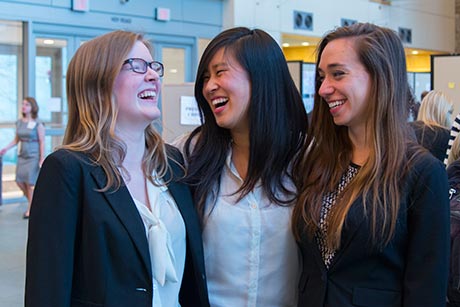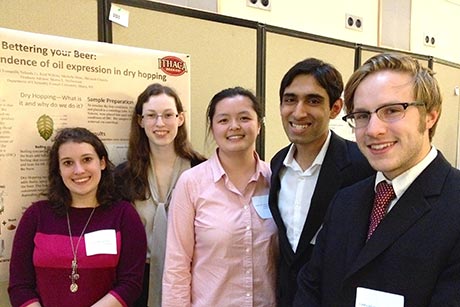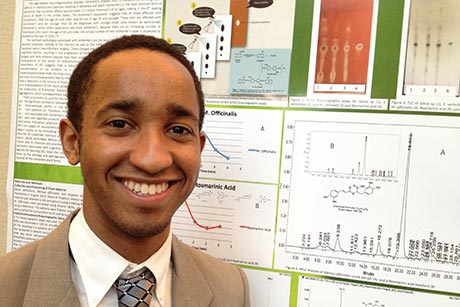Students present their research at 30th CURB forum
By Blaine Friedlander



Studying everything from a potential medicine to the aromatic properties of popular beverages, about 120 undergraduates put project posters on display April 22 at the 30th Annual Spring Research Forum at Duffield Hall. The event was hosted by the student-run Cornell Undergraduate Research Board (CURB), which served up pizza, cake … and knowledge.
At the forum, students shared their work and engaged with faculty and peers. Here are some samples:
Sarah Gutz ’15, Jenna Behrendt ’15 and Hana Bae ’15 presented a poster on their research examining how using language may detect Alzheimer’s disease earlier in patients with mild cognitive impairment. Rollie Hampton ’15 explained his two years of laboratory work to examine the therapeutic potential of Rosmarinic acid found in Melissa Officinalis, an herb in the mint family, in the treatment of Alzheimer’s disease. Potentially, Hampton said, this compound could help slow the progression of Alzheimer’s; he plans to submit the research for publication.
Researching couples who experience long-term separation, such as long-distance relationships, Devin Massaro ’15 found that people had increased anxiety and reduced sleep quality when they were apart from romantic partners. Massaro’s results indicated that sexual behavior – or “reunion sex” – is more intimate than during other periods in the relationship.
Owen Lee-Park ’15, Michael Charles ’16 and Junwon Jang ’17 – who work with Jonathan Butcher, associate professor of biomedical engineering – tested the stiffness of heart cushions (tissue) in normal and mutated mouse embryos. The stiffness of the tissue must be just right in order to produce healthy heart valves.
Grace Monks ’15 studied how people accurately remember things from within their own demographic groups but inaccurately remember things from other demographic groups.
Finding out that first impressions don’t necessarily stick, explained Brian Meagher ’15, is a good thing. He sought to learn how people can turn sour on an “attractive” person when presented with negative information.
Peering in on labor-management relations in New York state schools, Honore Johnson ’16 and Abigail Frey ’16, both in the ILR School, examined teacher-rating disputes. Their project, Bargaining for Better Schools, seeks to provide dialogue between school administration and union leaders, citizens and policymakers.
The eyes have it: Chris Traver ’17 and Tyler Cordell ’15 sought to understand how often you attempt to deceive if you know eyes are upon you. Study participants lied 9 percent less when they knew eyes – even eyes printed on the front of a test – were gazing upon them.
For completely academic purposes, five chemistry students sought to understand how to improve the taste of beer. Marissa Tranquilli ’15, Yolanda Li ’15, Reid Wilkins ’15, Michelle Bone ’16 and Shiv Chawla ’17 studied the process of dry hopping (adding hops to fermented beer) and found that 21 or 22 degrees Celsius is the perfect temperature to promote the best floral scent in hop aroma. The students used three hops found in Ithaca Beer Co.’s Flower Power IPA beer – Simcoe, Centennial and Amarillo – to analyze optimal volatile oils extracted from the hops.
The CURB forum organizers were Rob Gruber ’15, Sam Schraer ’16, Taylor Denara ’17, Jake Weiser ’17, Sara Ragi ’18 and Maria Sirenko ’16.
Media Contact
Get Cornell news delivered right to your inbox.
Subscribe